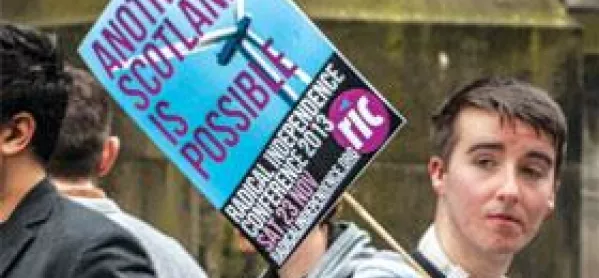Want to figure out the referendum? Ask a teacher

Schools are better than parents or friends when it comes to informing young people about the Scottish independence referendum, according to a new report.
The paper has been published by independent thinktank dpart, which supports political participation. It argues that schools have a crucial role to play in preparing young people for the vote.
“The formation of confidence in one’s own political knowledge in general and the referendum in particular is enhanced for young people when they engage actively in classes with the referendum question,” the report states.
“Those who have talked to their parents about the referendum are not substantially more likely to feel that they have enough information than those who have not. Similarly, talking to friends also does not enhance young people’s perception that they have enough information.”
However, it is not enough to take a general politics course, the report says. Specific engagement with the referendum issue in the classroom is required.
The referendum on 18 September will be the first national vote in which 16- and 17-year-olds will be allowed to participate, meaning that more than 120,000 young people could be going to the polls. A survey of more than 1,000 teenagers aged 14-17 carried out last year by researchers at the University of Edinburgh contradicted assumptions that young people were less interested in politics than adults.
Jan Eichhorn, one of the authors of the briefing and the survey, and a chancellor’s fellow at Edinburgh’s School of Social and Political Science, said the findings were “very empowering” for teachers. “Young people are not being biased into a yes or no vote,” Dr Eichhorn said. “But they do feel they are better informed and they feel they understand politics better in general. Teachers need to talk about this in class. Fundamentally, it works. Schools have a very important role.”
Fears that first-time voters might be prejudiced by teachers or families are also unfounded, the dpart report adds. “Young people are making up their own minds about whether Scotland should become an independent country or not,” it states.
“Neither talking to parents and friends nor in-class discussion goes together with greater likelihoods of voting in favour or against Scotland becoming an independent country.”
But Sheila Riddell, director of the University of Edinburgh’s Centre for Research in Education Inclusion and Diversity, warned earlier this year that teachers might shy away from covering the referendum because they were wary of appearing to be politically biased.
She claimed that schools had been given little in the way of information or resources to use in lessons, apart from material supplied directly by the two political campaigns.
“With young people having the vote for the first time, there is a responsibility there to give them some information to go on, [but] I think it is very hard for teachers,” Professor Riddell said.
However, Dr Eichhorn stressed that in his experience, teachers who had discussed the independence referendum in class had generally had positive experiences. “You get the odd numpty parent who says, `You are biasing my child’ but that is rare,” he said.
Some schools took the approach that teachers could discuss their own views openly and students welcomed this, but there were neutral teaching materials available for teachers who preferred to take a different route, he said.
A representative for the EIS teaching union said that teachers were highly experienced in dealing appropriately with complex and potentially sensitive issues.
“It is important that teachers are free to discuss the referendum and the importance of active citizenship to help inform the many young people who will be voting for the first time in September’s referendum,” the spokesman said.
Keep reading for just £1 per month
You've reached your limit of free articles this month. Subscribe for £1 per month for three months and get:
- Unlimited access to all Tes magazine content
- Exclusive subscriber-only stories
- Award-winning email newsletters



